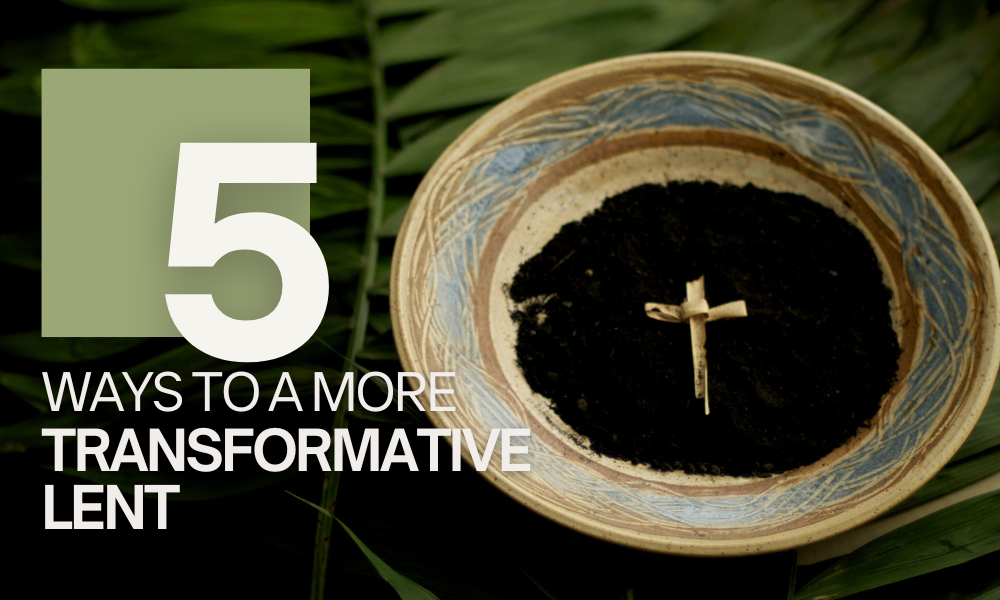
5 ways to a more transformative Lent
As Lent approaches, Catholics prepare to enter into a season of reflection, penance and renewal. For 40 days, the Church invites us to follow Christ’s example of fasting, prayer and almsgiving. It’s a time to deepen our spiritual life and grow closer to God.
As Lent approaches, Catholics prepare to enter into a season of reflection, penance and renewal. For 40 days, the Church invites us to follow Christ’s example of fasting, prayer and almsgiving. It’s a time to deepen our spiritual life and grow closer to God.
However, Lent is not merely about giving something up — it’s a season meant to transform hearts, renew faith and draw closer to the love and mercy of our Lord.
With this in mind, here’s a guide to help make the most of these 40 days. Drawing from Catholic tradition and teaching, these practices will allow for a more meaningful and fruitful journey toward Easter.
1. Begin with Prayer and Intention
Before jumping into the practices of Lent, it’s important to begin with prayer. The Catechism of the Catholic Church teaches that prayer is essential for cultivating a deeper relationship with God (2565). It’s a time for reflection, repentance and seeking God’s guidance. Start Lent by setting clear spiritual goals for the season. These goals should center on becoming a better version of yourself through prayer, fasting and almsgiving. Whether it’s daily Mass, reciting the rosary or committing to spend more time in quiet prayer, beginning with intention will give your Lenten journey direction.
Father Jacques Philippe, a noted spiritual author, encourages Catholics to embrace the silence of Lent.
“In a world filled with distractions, Lent is a time to intentionally quiet our hearts and allow God to speak to us,” he wrote.
Reflecting on the Gospel readings of the day or reading Scripture can open our hearts to God’s Word in a more profound way.
2. Embrace the Power of Fasting
Fasting has long been a hallmark of the Lenten season. The Church calls Catholics to fast on Ash Wednesday and Good Friday, and to abstain from meat on Fridays during Lent. Yet, fasting is not just giving up food. It is about emptying ourselves of distractions and selfishness so that we can be more open to God’s grace.
According to St. Thomas Aquinas, fasting is an exercise of self-control that strengthens the will to resist temptation and sin. Fasting creates a space for humility and allows one to focus on spiritual matters. The Bible tells us that one “does not live by bread alone, but by every word that comes forth from the mouth of God” (Mt 4:4). This verse emphasizes that fasting should redirect our attention to God and the spiritual nourishment He provides.
For many Catholics, giving up certain foods or treats during this time can be a meaningful act of self-sacrifice. But it’s also worth considering other areas in life where fasting can foster spiritual growth. You might fast from technology, social media or unhealthy habits/behaviors that distance you from God.
Pope Francis frequently speaks about the value of fasting and penance in bringing us closer to God. In his Lenten message for 2021, he wrote, “Fasting makes us more open to others and teaches us to be more compassionate.”
3. Practice Almsgiving
Lent is also a time for giving—almsgiving is a core pillar of the season. In his Gospel, Jesus calls on his followers to help the poor, feed the hungry, and clothe the naked. Almsgiving is not just about giving material goods, but it’s about making a deeper commitment to love one’s neighbor. The act of giving opens our hearts to the poor, the marginalized, and those suffering from injustice.
The Catechism encourages us to “care for the poor and the weak” (CCC 2446) and reminds us that “giving alms is one of the chief ways of expressing our love for our neighbor.” Through almsgiving, we imitate the generous heart of Christ, who offered His very life for the salvation of humanity.
Whether it’s through donating to a food bank, volunteering at a shelter, or supporting organizations that care for the needy, almsgiving is a tangible expression of God’s love in the world. Pope Benedict XVI taught that “giving alms is not just an act of charity, it is a path to transformation.” It teaches us humility and compassion, helping us see Christ in others.
4. Live with a Spirit of Repentance and Reconciliation
Lent is a time for Catholics to come to grips with their sins and ask for forgiveness. The Church invites the faithful to partake in the Sacrament of Reconciliation, a vital part of the Lenten journey. In this sacrament, Catholics experience God’s mercy in a profound way. Confession allows one to confront sin honestly and humbly, and to receive grace and healing.
Pope Francis often speaks about the importance of repentance during Lent, calling on all Catholics to open their hearts to God’s forgiveness. In his 2016 Lenten message, the Holy Father wrote, “In this time of grace, we are called to find healing in the Sacrament of Reconciliation, to allow ourselves to be transformed by God's mercy.”
Taking time to examine one’s conscience, ask for forgiveness, and renew one’s commitment to Christ’s way is an essential part of making Lent truly transformative.
5. Seek Community and Support
Lent is not meant to be a solitary journey. The Church emphasizes the importance of community in faith, and this is especially true during Lent. Participating in parish events, attending Lenten services, or joining a Bible study group can provide the support and encouragement needed to sustain your efforts.
Consider reaching out to a friend or family member to hold each other accountable in your Lenten commitments. The shared journey of prayer, fasting, and almsgiving fosters spiritual growth and creates a sense of belonging within the body of Christ.
In his Lenten message for 2023, Pope Francis urged Catholics to be “attentive to one another’s needs,” emphasizing the importance of walking together on the journey to Easter.
Lent is a season of spiritual renewal. Through prayer, fasting, almsgiving, and reconciliation, we draw closer to Christ and prepare our hearts for the joy of Easter. By embracing these practices with intentionality and openness, Catholics can deepen their faith and experience the transformation that comes through God’s grace. As we walk this 40-day journey together, let us remember that Lent is not an end in itself, but a preparation for the resurrection—the heart of our faith.
May this Lent be a time of growth, renewal, and deeper intimacy with our loving Savior.
Deirdre C. Mays is a writer and photojournalist, and the former editor of The Catholic Miscellany. Email her at dcmphotoj@gmail.com.



